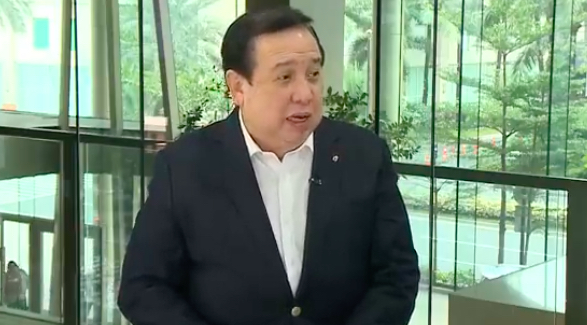The Philippine’s military has a lot to lose if the country follows through on threats to terminate the Visiting Forces Agreement (VFA) with the United States, Senator Richard “Dick” Gordon said this morning in an interview.
Gordon told the cable news show ANC Headstart that he worries for the Filipino military, which he called “the sick man of Asia,” and said that “a lot” of its capabilities “will be diminished” if the VFA is terminated.
Suggesting that the Philippine military is undermanned and under-equipped, he added that the possible termination would leave the Philippines defenseless against China, which has claimed huge swaths of the disputed West Philippine Sea.
“The point is, always look at ourselves first,” he said, warning of the consequences withdrawing from the VFA might have on defense. “Who’s gonna fight for us? Nobody’s gonna fight for you.”
The senator also downplayed the cancellation of Senator Ronald “Bato” dela Rosa’s U.S. visa — which touched off the whole controversy — saying it amounted to “nothing.” President Rodrigo Duterte first began pushing for the termination of the VFA after dela Rosa’s American visa was canceled almost two weeks ago.
“Senator Bato, in all fairness, can always go to the United States with President Duterte; [they can] call it an official mission. I’ll bet you they’ll be given a visa,” Gordon said.
Gordon added that Duterte’s off-the-cuff decision would affect over 5 million Filipinos living in the U.S., as well as those in the Philippines, because “this is a very pro-US country,” without elaborating further.
Gordon’s interview came after presidential spokesman Salvador Panelo told reporters on Friday that Duterte had officially ordered Executive Secretary Salvador Medieldea to send the notice of the VFA’s termination to the U.S. government. On Saturday, however, Defense Secretary Delfin Lorenzana told reporters that Panelo’s announcement was “fake news,” because Duterte’s order had not reached him, Medieldea, or Foreign Affairs Secretary Teodoro Locsin Jr.
Yesterday, Panelo tried to hastily evade blame for the confusion, saying that Duterte’s order, based on his “tenor,” will be sent to Medieldea and Locsin in the future. Panelo furthered downplayed the furor over the miscommunication as “much ado about nothing.”
Read: Duterte walks back threat to end U.S. military pact, orders review of impact
Last month, it appeared Duterte was having second thoughts about the VFA’s cancellation when he ordered Justice Secretary Menardo Guevarra to review the consequences of such a move after having already publicly threatened to implement it. Shortly after that, however, he appeared to recommit to his original plan, ordering his cabinet officials not to travel to the U.S. as a way of boycotting the superpower.
Leftist groups have long called for the cancellation of the VFA — which grants the U.S. jurisdiction over criminal cases involving American servicemen — saying it has led to American suspects evading justice. But even they questioned the president’s motives when the move to scrap the agreement was first announced over the dela Rosa visa flap.
The same urgency, they noted, was not present when American soldiers were accused of rape in 2006 in Olongapo, or when a former marine was convicted of killing a transgender Filipina in 2015. In both instances, the U.S. kept custody of the accused soldiers.
Duterte, meanwhile, has maintained that his snap decision to scrap VFA is “for the Filipino people,” not Senator dela Rosa.
Read: Young female activist arrested for allegedly hurling paint at US embassy
Even Foreign Affairs Secretary Locsin said last week that there were far-reaching consequences and risks to terminating the agreement. Locsin pushed for a review of the VFA, as opposed to its outright termination.
“Terminating the VFA will negatively impact Philippine defense and security arrangements as well as the overall bilateral relations with the U.S. and perhaps even at the sub-regional and multilateral level. Our contribution to regional defense is anchored on our military alliance with the world’s last superpower,” he added.




